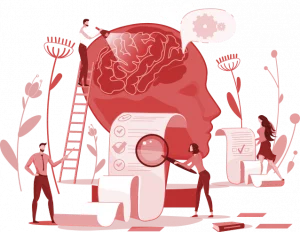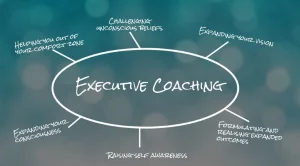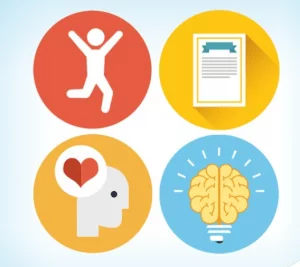Throughout the centuries, some wise people have considered happiness in many unique ways. If you do a simple online search for “quotes on happiness”, you’ll see just how much content there is on the subject.
Whether you’re considering a career change or just wanting a happier life at home, you can learn lots about happiness by checking out some wise quotes from philosophers, writers, entrepreneurs and fashion designers.
Let’s take a look at a collection of quotes about happiness from some famously wise, ambitious and forward-looking thinkers. We’ll put together some underlying themes that you can apply to your career path and your personal life.
Theme 1 – Tolstoy and Frankl: Choose Your Attitude to Choose Your Happiness
Leo Tolstoy, the famous Russian author, once said rather cleverly: “If you want to be happy, be.”
Different people may interpret this in their own way, and that’s what makes it such a great quote. One way to think about it is to compare two realities that you face:
- Chasing your dreams and creating a life of happiness; or,
- Living in the present moment and being happy with what you have.
It’s hard not to think of happiness as something to seek out and achieve. Maybe you’re chasing a big promotion at work that comes with a significant salary increase. That pay raise might get you a new phone or computer, but chances are, the novelty will fade over time. So maybe then you buy a new car. But over time, it will probably turn into “just another vehicle”. The cycle of chasing happiness can go on forever.
Instead, Tolstoy’s simple message is about choosing happiness as a state of being, instead of something you achieve.
If you can be happy with the life you live, you don’t necessarily need a reward to validate a life worth living.
Victor E. Frankl, a psychiatrist and Holocaust survivor wrote that: “Everything can be taken from a man but one thing: the last of the human freedoms—to choose one’s attitude in any given set of circumstances, to choose one’s own way.”
Frankl is an immensely influential figure in existential thinking, so at first glance, that quote can feel heavy and difficult to digest.
During his time in the Theresienstadt concentration camp, his life was desperate and hopeless. He had every reason to be miserable, but he chose his attitude- he chose his own way. He decided to use his psychiatric skills to aid the other victims at the camp. He used the last of his human freedoms to make a positive impact on a grim situation.
The takeaway from this is that your attitude interprets your circumstances, and you can choose your attitude. Frankl’s view on happiness is a fitting companion to Tolstoy’s because they focus on being content in your current circumstances.
Remember this: through your attitude and outlook, you have the power to make your reality a happy one.
What can you do to improve your attitude and mindset? Harvard Medical School suggests these methods:
- Practice gratitude- Appreciation for what you have plays a big part in a positive attitude. Thinking about these things- tangible or intangible- and remembering how they make you feel is a great way to instil gratitude. If you’re interested, keeping a journal can help to think about these things throughout your day. Then, if you’re ever feeling down, you have something tangible that can show you a positive perspective.
- Foster mindfulness- Mindfulness is being aware of how you are feeling in the present moment. It involves being sensitive to both positive and negative feelings. By cultivating mindfulness, you will be more able to focus on your current state instead of worrying about past issues or future obligations.
With a renewed mindset and by practicing gratefulness, you can positively shape your life and career around your attitude, not as a response to the challenges you face.
Theme 2 – Emerson and Kierkegaard: Don’t Waste Your Time Being Unhappy or Angry
Ralph Waldo Emerson, the 19th century American philosopher, believed: “For every minute you are angry you lose sixty seconds of happiness.”
While it might not be worth dwelling on Emerson’s math, the quote can still teach a thing or two about how you spend your time. Being angry is much less productive than being happy. In a study by Jessica Pryce-Jones, participants who claimed to be happy 50% more productive at work, and 180% more energised at work. Happiness is also connected with intrinsic motivation. Many theories of motivation prove that when we do things simply for the joy of doing them, we attain better outcomes.
Emerson’s contributions to transcendental philosophy, or the belief that people are inherently good, are essential to keep in mind now more than ever. Today, it’s so easy to spread negativity considering the influence and anonymity of the internet and social media. Even though it allows us to share our lives and connect with others, social media can be draining because of the pressure to live an aesthetic life. Negativity is contagious, and it prevents personal growth. To Emerson, being anything other than happy is a waste of time.
Have you ever shared a problem with a friend about a relationship or your career, and their response is a casual, “that’s life”? Philosopher, Soren Kierkegaard would disagree. Kierkegaard was a Danish philosopher who said, “Life is not a problem to be solved but a reality to be experienced.”
A student of philosophy might think it’s outrageous to compare Kierkegaard and Emerson. The two thinkers wrote during the 19th century, but they generally had competing viewpoints in classical philosophy.
In this quote, Kierkegaard says that life is better when it’s experienced, not when it’s spent thinking (or overthinking) of ways to solve your problems, or being preoccupied with past or future difficulties. Life is a good thing that has problems; life is not the problem itself. If we focus on our experiences and living in the moment, we can see our problems from the perspective of a bigger picture.
Life can be full of problems, but remember this: it’s best not to think about the whole of reality as a problem, but rather as a positive experience that may have problems.
What can you do to avoid getting caught up in the negativity of everyday life?
- Do something practical. Healthy distraction is a way to let go of negative worries that hinder productivity and happiness. By taking a break to do something you enjoy such as painting, exercise, writing, or meditation, you will be able to leave the problem and come back to it (if necessary) with a clear mind. But chances are, your mind will be taken off whatever upset you in the first place.
- Don’t feed others’ negativity. It is easy to join in on that breakroom gossip about your managers, but it will probably leave you feeling more upset than when you entered the room. Instead, take that same time to do something positive – compliment a coworker, or take a short walk and clear your mind.
Theme 3. Pulitzer and Dahl: Happiness Looks Good on You
So far, we’ve looked at some deep thinking quotes from some philosophical thinkers. It’s time to lighten things up.
Now let’s consider what fashion designer Lilly Pulitzer and novelist Roald Dahl have to say about happiness. You might not think of them as wise thinkers but they were extremely dedicated to their crafts. Their insights about happiness, both timeless and whimsical, might surprise you!
“Being happy never goes out of style” – Lilly Pulitzer
It’s fitting that Pulitzer, best known for the bright and colourful fashion of her clothes and accessories, wants to spread joy. She reminds us all that being happy is simply another fashion statement.
Even better, the fashion of happiness is timeless, meaning it’s an aspect of your life that accompanies you at all times.
“If you have good thoughts it will shine out of your face like sunbeams and you will always look lovely” – Roald Dahl.
In this quote from his novel The Twits, Dahl tells us that by thinking positive thoughts, your outlook is visible to those around you, too. Combined with Putlitzer’s insight, it’s a great reminder that while emotions are an internal process, they can also impact how you present yourself to others.
Remember this: Happiness is a look that inspires beauty, confidence and can stoke your ambition.
Here’s what you can do to rock your inner (and outer) happiness like Dahl and Pulitzer:
- Practice smiling at yourself. This suggestion gets overused and can be a silly exercise. Still, it can also be a simple and physical way to practice happiness. Dr. Isha Gupta, a neurologist at IGEA Brain and Spine, says that smiling releases dopamine and serotonin, which are the two neurotransmitters that lower stress and increase happiness.
- Being happy will boost your confidence and spread positivity to those around you. Dr. Eva Ritvo, a Miami psychiatrist, says that this is because we have mirror neurons that can detect and reflect the feelings of those around us. These mirror neurons are what allow us to pick up communication signs from others and copy them, and they have also been closely linked to empathy. This explains why both positive and negative body language can be contagious.
Where to go from here – practice happiness
Now you know how Russian and British novelists, traditional philosophers and even fashion designers have shared their perspectives about happiness. At first glance, these inspirational people don’t seem to have much in common. However, happiness should be a universal experience, and these people all agree that a positive outlook improves your life. Together, the themes can help you boost your outlook and your courage to choose happiness instead of anger or stress.
Now it’s time to put what you learned to practice. In your career and life, you’ll face obstacles. By choosing the right attitude and not wasting your time with anger, you can overcome obstacles that would have previously got you stuck in the ruts.
And don’t forget – happiness is a good look on you and the fashion advice is free of charge. So dress yourself up and practice happiness every day.
Want to learn more about happiness and identifying what makes you happy? Find a life coach today.







